BFI London Film Festival Week 2: The Weird, The Wonderful & The Unclassifiable

Alistair is a 25 year old writer based in Cambridge.…
After kick starting the festival last week with a series of preview screenings, this week the London Film Festival properly opens to the public, with some of the biggest films of the upcoming awards making their British debut. Before we cover the massive contenders, Film Inquiry writers Alistair Ryder and Chloe Walker (Ryan Morris flew to New York this week- although he did manage to pen one review below) give the lowdown on the most memorable films they saw in week two, both good AND bad.
1% (Stephen McCallum)
Alistair Ryder: Film Inquiry writer Alex Lines has recently been making a YouTube series documenting his thoughts on the current failings of the Australian film industry. One of these is his belief that Australian films have a tendency to limit their own audiences by taking fun, genre movie concepts and making them utterly joyless and depressing, to the extent that nobody will come away from the film satisfied. In this regard, 1% (although not a bad film in its own right) is pretty emblematic of what is currently wrong with Australian filmmaking, taking a Sons of Anarchy-inflected story about leadership rivalries within a motorcycle gang and transforming it into a finished product that is trying so hard to be gritty, it just comes across as tedious and depressing.
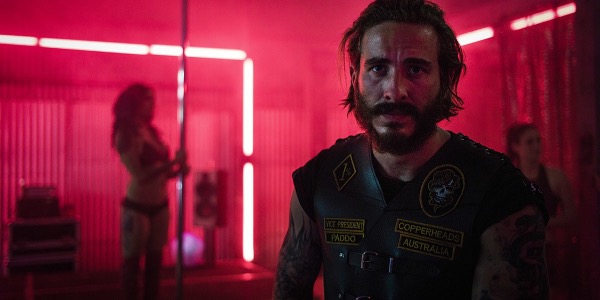
On paper, the film could easily be a fun piece of B-movie filmmaking, but director Stephen McCallum (in his feature debut) seems obsessed with making it “darker” than it needs to be. Why else do we have subplots concerning learning disabled siblings with drug addictions, or the gang’s leader hiding his repressed homosexuality by raping seemingly every guy in sight, other than to force a feeling of self seriousness that isn’t remotely necessary for the story being told? In the moments the film starts to work, such as an effective ten minute home invasion sequence in the third act, are when it embraces the violent carnage expected of a movie in this vein.
When it doesn’t work is when it appears to show pretensions towards being a wholly serious drama or (heaven forbid) a character study, despite everybody onscreen never amounting to anything more than a mere archetype. I can’t criticise McCallum for wanting to make something that aspired to being more than just a trashy thriller, but the air of overbearing self-seriousness that surrounds every scene will leave many an audience wishing that it was just that.
Abu: Father (Arshad Khan)
Chloe Walker: Abu was the father of filmmaker Arshad Khan. As his son explains, Abu could be a difficult, often conflicted man, but with his complicated life story, that isn’t surprising. Arshad takes us through his father’s life, combining the tale with his own experiences of being a young gay man in a conservative Muslim family, and emigrating to Canada from Pakistan at the age of sixteen. The complex family history is illustrated with a tapestry of home movies, film clips, diagrams, archival footage and animation.

For a documentary with an eighty-minute duration, Abu: Father covers a lot of ground. Spanning major world events from the 1947 partition of India to the 9/11 terrorist attacks, topics such as sexuality, the immigrant experience, terrorism, racism, and sexual abuse all fall under the film’s engaging microscope.
Despite the heaviness of its content, for the most part Abu is light in tone. Khan makes for an entertaining storyteller and peppers his film with personality (he appears to have a home movie to go with each one of his memories). The way he pairs his own family’s story with the larger picture of those in his position is particularly illuminating; a fitting description of the movie as a whole.
Bad Genius (Nattawut Poonpiriya)
Alistair Ryder: One of the great joys of film festivals is seeing some of the weird and wonderful movies that have become box office hits internationally so far this year. In the last festival dispatch, I saw Jailbreak, a Cambodian martial arts film that broke box office records in its homeland – although it lost a lot of its cheesy charm in translation. Thankfully, that’s not the case for Thai teen thriller Bad Genius, a gloriously preposterous work that is one of the most unique (and certainly one of the most enjoyable) heist movies in recent memory.

Lynn (Chutimon Chuengcharoensukying) is an A-grade student, who has just been accepted in to one of Thailand’s most prestigious schools. Not long after starting, she befriends Grace, who is as unknowledgeable as she is likeable – Lynn agrees to help her cheat her scores during an important exam. Word starts spreading, and everybody wants the help of her services. With the exam questions toughly guarded, she devises a new scheme for multiple choice questions involving mimicking the playing of a piano (yes, really), that earns her tons of money, but nothing could prepare her for an ambitious final “heist”, involving flying to Sydney to cheat a prestigious entrance exam.
Director Nattawut Poonpiriya has cited a range of paranoid 70’s thrillers, such as The Parallax View and The Conversation, as major influences, and it has to be said, the film is only a failure when judged against the high watermark of the films that inspired it. This is a significantly less tense proposition than those classics, but it is certainly an enjoyable ride from beginning to end, with a tongue lodged firmer inside its cheek than those highbrow influences would suggest. It’s the sort of gleefully enjoyable mainstream film that you can imagine being remade into a significantly less interesting Hollywood adaptation, where all the offbeat charm of the original gets lost in translation. Make sure it never comes to that – seek out Bad Genius. You won’t regret it.
The Cakemaker (Ofir Raul Graizer)
Chloe Walker: The Cakemaker has a simple premise, and a predictable one. German baker Tomas (Tim Kalkhof) begins an affair with Oren (Roy Miller), a travelling Israeli businessman who is married to Anat (Sarah Adler). When Oren dies in a car accident, Tomas travels to Jerusalem to meet Anat, without revealing his connection to her husband. He gets a job in her café, and the two swiftly become friends.

Take a guess where this is going. You’re almost certainly right. There are no narrative surprises here. Yet despite the rather obvious plotline, The Cakemaker remains a subtle and involving drama, with a sincerity that cuts through the more formulaic elements. The directing is sensitive, and the performances uniformly great.
Tim Kalkhof, in particular, is a revelation here. His turn as Tomas is defined by its stillness; the more emotional he is feeling, the less he moves. He barely speaks. This makes the way he visually breaks in two at the film’s conclusion all the more wrenching. Kalkhof is a masterclass in subtlety and the amount of meaning that can be conveyed with a plaintive look, or a slight head movement. He, more than anything else, makes The Cakemaker a vital watch.
Foxtrot (Samuel Moaz)
Alistair Ryder: If you thought director Samuel Moaz couldn’t make another film as claustrophobic as his 2009 anti-war drama Lebanon, famously set entirely inside a tank, then Foxtrot will make you think again. The film opens in Tel Aviv, a housewife (Sarah Adler) falling to the floor upon seeing some soldiers, there to inform her and her husband (Lior Ashkenazi) that their son has passed away in the line of duty. Moaz captures their inner turmoil by making their home surroundings feel every bit as prison-like as the tank in his previous film, their bereaved emotional anguish hanging heavy over every frame, promising for a dispiriting two hours to follow.

And then, something happens: the film has pulled an emotionally manipulative trick on the audience with its opening act, and it slowly transforms into an unclassifiable blend of black comedy, surrealism and socio-political drama that proves to be equal parts unflinching and unforgettable. The movie’s middle act takes place entirely on Israel’s border territory, following some soldiers at a checkpoint so deserted, more camels pass through on a daily basis than cars. The imagery gets increasingly surreal, documenting the bubbling undercurrent of insanity that comes hand in hand with being left on the “edge of the world”, as well as offering a damning political allegory too.
A handful of sequences stand out (a personal favourite: a hilarious story about how a bible handed down between generations got replaced over the years by a porn magazine), and the film is certainly a bold, brave working of art. My only concern is that, in the week since viewing, the film doesn’t have the tight command of the disparate tones that many others believe it does. It makes for a genuinely unclassifiable film that is undoubtedly one of the best I’ve seen at the festival – yet one that, in retrospect, I’m thinking more about in terms of specific moments, instead of being impacted by the narrative as a whole. It’s too fragmented and tonally messy to fully hang together, but the ambitious genre splicing on show here has still paid off when it comes to creating an entirely singular work that I’ll be thinking about for some time to come.
Good Manners (Marco Dutra, Juliana Rojas)
Ryan Morris: Discussing a film as unclassifiable as Marco Dutra and Juliana Rojas‘ Good Manners is tricky. This is a film that deserves to be left unspoiled in every regard, a film that evolves and changes so rapidly that the film you finish with is entirely unrecognisable from the film you began. If I’d have fallen asleep and missed a key sequence the middle act, I think I’d have thought someone had played a trick on me when I woke up and saw what the film had become soon after.
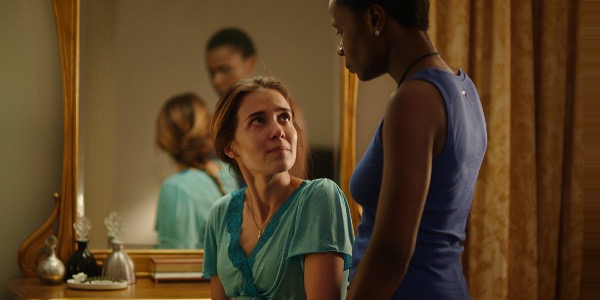
It’s all rooted in a masterfully controlled performance from Isabél Zuaa, who commands the screen in both halves of the film. In the former half she’s delicate, quiet, almost drifting around the frame without purpose. Clara needs to ooze vulnerability for the earlier half of this story to work, and Zuaa let’s just enough through for us to sympathise with and grow to like Clara without sacrificing her integrity. Clara turns into a different beast entirely in the film’s second half though, and so to avoid spoilers let’s just say Zuaa turns in a formidable, game changing performance here, and leave it at that.
Good Manners is a film rooted in its unpredictability, defined by its wholehearted originality. It doesn’t handle its narrative shift as a plot twist, more of a slow build up to a singular gut punch of an image that hasn’t left my mind since it first exploded onto the screen – I leapt out of my skin when it happened. You could argue that the film is perhaps overlong, and you could easily make a case for supporting characters in the second half being woefully underdeveloped, but any slight issues of this sort are more than offset by how strong the core of this film is. Good Manners is dark and different and delightfully deranged – believe me when I say there has never been anything else on the same wavelength as this.
The Grown-ups (Maite Alberdi)
Chloe Walker: The people we meet in The Grown-Ups have been attending class together for more than forty years. Anita, Andrés, Rita, Ricardo and David have Down’s Syndrome, and so although they are all middle aged, they continue to attend a special school that teaches classes in catering and how to be a ‘conscious adult’.

Understandably, the students are beginning to get fed up with their lack of independence, and are clamouring for more. Anita and Andrés, the real focus of the documentary, are in love, but their romance hits constant roadblocks. They earn nowhere near enough from a job caring for the elderly to even buy the cheapest wedding ring. In Chile, where the film takes place, people with Down’s Syndrome are not allowed to get married. These knockbacks take a hefty toll on the burgeoning relationship.
The Grown-Ups completely envelops you in the world of these middle-aged students (anyone without Down’s Syndrome is obscured by the camera). Along the way, thought-provoking quandaries pop up about how to best treat romances between adults with this disability, and how much independence they can realistically hope to have. It’s a sensitive, intelligent documentary, which maintains a healthy sense of humour to balance out the many upsetting moments.
Lean on Pete (Andrew Haigh)
Alistair Ryder: Andrew Haigh needs to be recognised as one of the greatest British filmmakers currently working, as Lean on Pete is yet another beautifully realised character study – one that so accurately portrays the desperate life of the working classes in the cash strapped American heartlands, you’d swear it was coming from a stateside filmmaker, and not a British expat. Charlie Plummer stars as 15 year old Charley, who lives with his alcoholic father (Travis Fimmel), who is more concerned about the next drink, or bringing home another woman, than he is caring about making a healthy income in their new home of Portland.
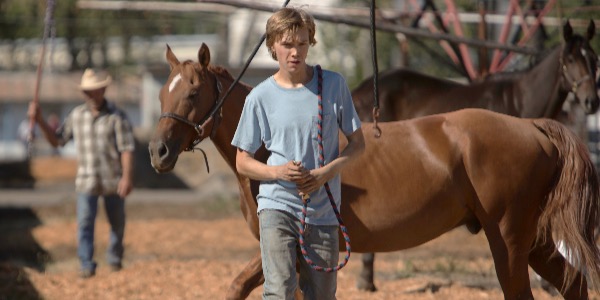
Charley soon meets Del (Steve Buscemi), a horse trainer who offers him money to help take care of his livestock for the day. Jumping at the opportunity, he soon unexpectedly bonds the most with Lean on Pete, a racehorse who is one losing race away from being sent to Mexico to be slaughtered. In Charley’s chaotic homelife, where his upbringing means regularly seeing his father beaten up, this calm horse quickly becomes a source of hope, and he painstakingly, heartbreakingly attempts to avoid it being sent away. Alas, after a losing race, Del orders Charley to prepare him for his journey south of the border next day, and Charley rushes away with the horse, journeying from all the demons circulating at home.
Although adapted from a novel, Haigh’s film is a pure cinematic spectacle; the narrative is a cross between the “boy’s own adventure” of The Black Stallion and the bluntly realist road trip of American Honey, possessing a quietly stunning visual grandeur that’s as spectacular as either of those touchstones. As the film’s second half increasingly devolves into an episodic journey across the States, many have argued the film loses its way.
I disagree; whereas Andrea Arnold’s American Honey followed a similar road trip path, it did so in a way that felt aimless and too self consciously attempting to define a generation. Haigh, on the other hand, places his characters first and foremost, with a sense of empathy that makes Charley’s slow descent into something close to homelessness all the more heartbreaking – not to mention more breathtaking, due to the epic canvas this intimate tale has been transplanted on to.
Lean on Pete is a profoundly sad film at times, offering an unflinching look at a teenage boy left to fend for himself, kept strong by his companionship with his horse, who comes to represent everything in life he’s missing emotionally. But it is far from a miserabilist drama; it gets bleak, unflinchingly so, but a warm humanity is never too far from Charley’s life, even if it sometimes seems like all hope is gone. Haigh may not shy away from bleak realism, but Lean on Pete is proof that he is one of the most humanist directors working today.
Life Guidance (Ruth Mader)
Chloe Walker: With echoes of recent dystopian dramas like Equals and The Lobster, Life Guidance takes us to the near future where productivity and efficiency are key. Children sing songs with lyrics like, ‘I’ll be better than me’, and ‘That is optimal’. Those operating on a less than perfect level are sent to live in the mysterious Fortress of Sleep. This has become an imminent danger for depressed businessman Alexander (Fritz Karl), who is put under the watchful eye of the mysterious Life Guidance company.
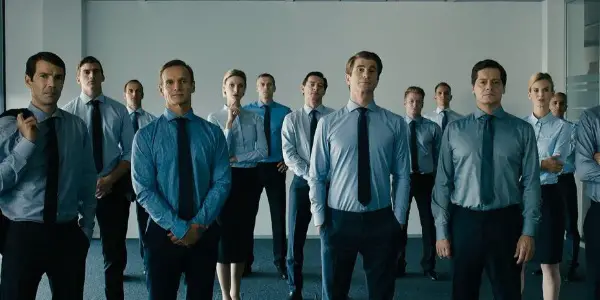
Life Guidance builds up an austere atmosphere in an appropriately efficient manner. Not a word is wasted, nor a note of music. Director Ruth Mader’s stark compositions convey a world you really would not want to live in, though the film isn’t short on dark humour. Colin Firth look-alike Fritz Karl gives an enjoyably understated performance as our guide through a world that brims over with ideas.
Unfortunately, it’s in exploring these ideas that the movie stumbles. You expect ambiguity in films like Life Guidance, but there’s a limit. A film that grows stranger with every scene, adding increasingly complex thematic alleys, leaves you desperate for some kind of answer, however small. There are none to be had here. Life Guidance gets lost in the weeds and collapses in on itself, ending weakly. A real shame, with all there was going for it.
Life Imitation (Chen Zhou)
Chloe Walker: We see a text message conversation with a young, depressed woman having trouble balancing a girlfriend and a boyfriend. A lone, gun-toting female avatar wander around a city at night in Grand Theft Auto. A pair of lesbian friends talk about how they can’t be themselves ‘with boys’. A mixed gender group discuss their intimate opinions on sexuality. Various people alone in bed. A weeping woman exclaims, “Everyone is lying to me!” Back in Grand Theft Auto, there’s a shoot out on a beach. In all these scenes, phones are omnipresent.
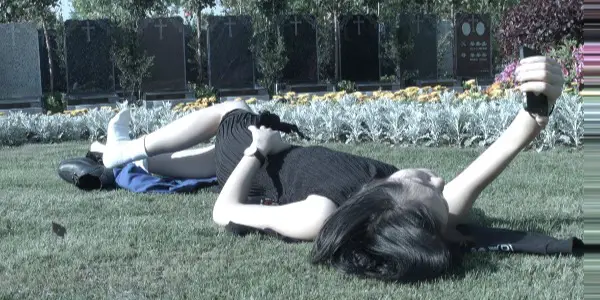
From its title alone, Life Imitation has what seems like an obvious message. We are living an imitation of a life; technology (whether it be video games or our smart phones), has removed us from reality. Understandably for its experimental nature, quite a few scenes in the movie don’t slide comfortably into this anti-technological narrative, which somewhat dilutes the larger meaning.
Treating Life Imitation as a mood piece rather than a message piece is more rewarding. Chen Zhou’s debut feature combines these images from real life and video games in such a skilful, seamless way, that at times it is hard to tell which realm we are in. That gives the film an otherworldly feel that permeates much more than the jumbled message.
On the Beach at Night Alone (Hong Sang-soo)
Chloe Walker: Young-hee (Kim Min-hee), an actress, has just concluded a well-publicised affair with her married director. The blowback has left her adrift and wandering. In On The Beach At Night Alone, she wanders through countries on two continents, talking with friends, and trying to figure out what she should do next with her life.

Though the film’s meandering pace and apparent aimlessness can be challenging, On The Beach At Night Alone is nonetheless a striking, memorable work. Kim Min-hee, seen recently in Park Chan-Wook’s The Handmaiden, gives another mesmeric performance – one moment she’s peaceful, the next she’s screaming, and her transitions between the two states are so smooth it’s hard to discern the inciting incident. She doesn’t know what she’s going to do next, and neither do we, which is why you can’t take your eyes off her.
Both Hamburg and South Korea are filmed in wintery blues and greys, and work as the perfect backdrop to such a liminal film. Writer-Director Hong Sang-soo adds a couple of lowkey, but surreal touches (a man aggressively asking the time, and another over-zealously washing some windows) to create a physical landscape perfectly reflecting the mind of a woman at a crossroads.
Resurrecting Hassan (Carlo Guillermo Proto)
Chloe Walker: Denis, Peggy and Lauviah are a family of buskers, living in Montreal, who have all been blind since birth. More than a decade ago, they lost their six-year-old son and brother in a tragic drowning accident. Since then, they have become followers of Grigori Grabovoy, a Russian ‘healer’ who claims he can regenerate organs and thus resurrect people from the dead. They are hopeful they will soon be with Hassan once more.

If Resurrecting Hassan was fictional, it may well be accused of being too fantastical, but Carlo Guillermo Proto’s film is in fact a documentary. Using uncomfortably intimate close-ups, Proto follows this extraordinary family as they go through a pivotal time in their lives.
Despite an emotive premise, and some admittedly moving scenes of the family singing in the metro, Resurrecting Hassan is too formless and near-exploitative to leave much of an impact. What starts as a story of a lost family fruitlessly seeking help from the spirit world swerves into a more quotidian drama, and it’s difficult to work out what Proto is actually trying to say. The on-the-nose choice of song at the end left me wincing.
Tonsler Park (Kevin Jerome Everson)
Chloe Walker: You know when you go to a museum, and one room is playing an experimental film, you watch for a few minutes and then go and look at a painting? Well Tonsler Park could very well be playing in that room.
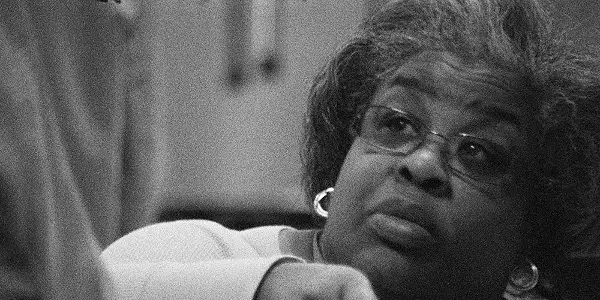
Set in voting stations across Charlottesville, Virginia on the day that Donald Trump was elected to the world’s highest office, this could have proven one of the timeliest movies of recent years. Instead, it is various ten-minute-long shots of different African-American government workers as they deal with members of the public, whose bodies repeatedly block the view of the largely static camera. Privacy regulations mean the sound is out of sync with the picture, but all you really hear throughout are friendly greetings from the officials to the public. And that’s it. That’s the whole film.
There’s an argument to be made that Tonsler Park is deeper than that. That the focus on African-American government workers, on the day a man many consider a white supremacist is elected President, fills the film with profundity. Maybe it does. But surely there was a more interesting way to express this point than the one Tonsler Park picks? Did the film really have to be feature length?
I envy people who saw deeper meaning here. I just saw the back of people’s heads for eighty very long minutes.
And that just about covers it for week two! Head back next week for more of our reviews fresh from the London Film Festival. Which movies are you most intrigued by, and what should we cover next?
Does content like this matter to you?
Become a Member and support film journalism. Unlock access to all of Film Inquiry`s great articles. Join a community of like-minded readers who are passionate about cinema - get access to our private members Network, give back to independent filmmakers, and more.
Alistair is a 25 year old writer based in Cambridge. He has been writing about film since the start of 2014, and in addition to Film Inquiry, regularly contributes to Gay Essential and The Digital Fix, with additional bylines in Film Stories, the BFI and Vague Visages. Because of his work for Film Inquiry, he is a recognised member of GALECA, the Gay & Lesbian Entertainment Critics' Association.













